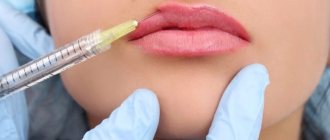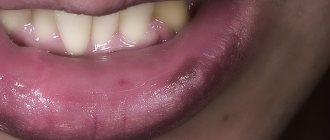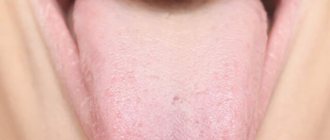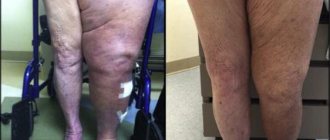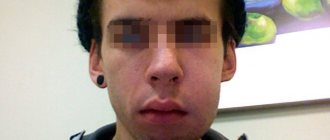What is leg swelling
Swelling of the legs is an external manifestation of the accumulation of fluid in the body. At the same time, the limb itself noticeably increases in size, the skin on it becomes loose, and when pressed, dents appear that do not disappear instantly.
Swelling usually occurs in the evening, although it can still cause discomfort the next morning. It is localized:
- in the feet;
- in the ankles;
- in the legs;
- from socks to knee.
Depending on the reasons, either one leg or both may swell. Symmetrical distribution often indicates generalized edema, which may be a symptom of a life-threatening condition.
If this trouble appears rarely, then you can fight it with folk remedies. The regularity of occurrence indicates a disease of the internal organs. Therefore, it is important to establish the nature of the swelling.
Duration of swelling
Are your lips swollen after lip augmentation, and would you like to know how long this effect will last? It all depends on the drug used by the cosmetologist, its volume, the number of injections and the individual characteristics of the body. Fillers containing low molecular weight hyaluronic acid cause minimal side effects and complications; more concentrated gels often provoke severe swelling. Normally, swelling lasts no more than 14 days and goes away without outside intervention. If the reaction is strong, the condition bothers you, or lasts longer than expected, seek help from a cosmetologist. The key to successful results of the procedure is the correct choice of specialist and the use of high-quality drugs.
Causes of leg swelling
When there is too much fluid in the tissues, it means that there is a malfunction in the functioning of the body. Most often, swelling is caused by:
- protein metabolism disorder;
- damage to cell membranes, increasing their permeability;
- changes in pressure differences in tissues and vessels;
- impaired blood circulation.
There are many reasons for such failures. Some are temporary (allergic reaction, bruise, infection). Others indicate the development of pathologies of the lower extremities (varicose veins, thrombophlebitis). Still others indicate serious diseases of the internal organs (heart, kidneys, lymphatic system).
A person cannot independently determine why his foot is swollen: because of uncomfortable shoes or because of a blocked blood vessel. Therefore, you should not postpone a visit to the doctor for subsequent treatment.
How to relieve swelling after lip augmentation with hyaluronic acid
The injection of hyaluronic acid has long been used in aesthetic medicine to add volume to the lips. This substance is also produced by the body itself. Therefore, the procedure is safe and does not cause drug rejection. The first few days after lip contouring, they swell. This is a normal reaction. In order to speed up the process of removing swelling, it is better to follow the recommendations of specialists and take care of your lips after augmentation. In addition to excessive swelling after lip contouring, bruises, balls and allergic reactions can be observed.
Causes of swelling
The consequences of lip contouring are divided into expected (that is, not dangerous) and side (undesirable).
Swelling in the first days after the procedure is an expected result, the body’s response to the introduction of hyaluronic acid. Its molecules attract and bind to water, holding it. Lips are moisturized and plump. In the first few hours after the procedure, such a reaction will be pronounced. Gradually, the swelling subsides, and the lips acquire a natural swelling.
Swelling is also a natural reaction of soft tissues to damage from a needle.
Such swelling is an expected result. They go away on their own within 2-3 days.
Swelling can also occur for other reasons. There are situations from which no one is immune. During the contouring procedure, a puncture of the wall of a large vessel is often observed. This swelling is accompanied by a hematoma. Some drugs contain hyaluronic acid and the anesthetic lidocaine. Some people have an individual intolerance to this component. An allergic reaction manifests itself in the form of excessive swelling of the lips.
Lips may swell due to the incompetence of a cosmetologist:
- Injecting too much filler into the lips.
- Infection of the soft tissues of the lips.
Before performing the procedure, the doctor must check the patient for contraindications. You should tell your doctor in detail about all your diseases, allergies and other characteristics of your body.
After collecting anamnesis, the cosmetologist calculates the required volume of the administered drug. The specialist must use sterile instruments to prevent infection of the lips, which leads to swelling and inflammation.
To reduce the likelihood of lip swelling, you need to contact only professionals!
How long does swelling last?
Normally, swelling of the lips after the injection of hyaluronic acid lasts about 2-3 days. After which it decreases within 2-4 days. This is the body's natural reaction to the drug.
If a large vessel was damaged during the procedure, it will take longer for the tissue to heal. Bruising and swelling completely disappear after 7-10 days.
In other cases, excessive volume that does not go away for more than a week signals an allergic reaction to the filler or a mistake by the cosmetologist. Such situations require immediate consultation with a doctor.
How to relieve swollen lips
Swelling is an adequate reaction of the body to mechanical intervention. If the work is done efficiently, excessive swelling goes away quickly, within 2-5 days. To speed up this process, it is recommended to follow the recommendations of a cosmetologist:
- On the first day after the procedure, you can periodically apply a cold compress (frozen food or ice wrapped in cloth, a cold spoon, etc.).
- Gentle self-massage before bed will speed up the removal of swelling.
- For several weeks after contouring, special moisturizing and nourishing creams should be applied to the lips.
- The use of oily masks. You can make them yourself at home from natural products: cream, cottage cheese, sour cream with the addition of cucumber. You can apply the mask from the 2nd day after the procedure, 2 times a week.
- Special gymnastics for the face will shorten the recovery period.
- It is best to avoid applying cosmetics to the mouth area, or to reduce its use to a minimum.
- On hot days, it is recommended to apply sunscreen on your lips before going outside.
- You cannot visit the bathhouse, swimming pool, sauna, solarium and beaches to avoid overheating of the intervention area.
Clients with frequent herpes outbreaks are advised to take a course of prophylaxis to reduce the risk of infection during the contouring procedure.
Why does one leg swell?
If the swelling is asymmetrical, its cause is localized directly in the affected limb. Swelling may occur due to bruises on the legs or more serious injuries:
- ankle joint injuries;
- meniscus tear;
- separation of the calf muscle;
- bone fracture;
- tissue compression.
Venous edema is also most often unilateral. Varicose veins cause fluid stagnation, but they are localized in one limb where the vessels are affected. This is indicated by the characteristic venous network.
Thrombophlebitis disrupts blood circulation, and at the same time the outflow of fluid from tissues. In this case, swelling is accompanied by other unpleasant symptoms: fever, pain, compaction in the blockage area.
Why do both legs swell?
If by the end of the day both lower limbs are swollen, it means that excess fluid is present throughout the body. Most often this condition is caused by:
- heat;
- excessive fluid intake;
- obesity;
- uncomfortable shoes (tight, high heels, completely flat soles);
- flat feet;
- unhealthy diet (lots of salty and spicy foods in the diet);
- standing on your feet for a long time or in an uncomfortable position.
Fluid stagnation in these cases is caused by improper load distribution. None of the above indicates a threat to life, and the swelling goes away in a day or two. For some, it is enough to take off their shoes and relax, while others resort to folk remedies to relieve discomfort. But symmetrically swollen legs can also indicate more serious diseases that require urgent treatment.
When general swelling indicates danger to life
Sometimes swelling of the lower extremities is a symptom of a general imbalance in the body's hydrobalance. In the case of heart failure, the body's main muscle cannot cope with pumping blood. The fluid in the body is distributed unevenly, and too much accumulates at the bottom. If the patient stands or sits in one position for a long time, his feet and legs swell.
Kidney failure can also lead to swelling. It appears not only on the legs, but also on the arms, face (mainly under the eyes), and abdominal wall.
If cardiac edema develops gradually (over weeks), then renal edema develops very quickly. With cardiac diseases, the skin becomes colder, with kidney diseases it maintains a normal temperature.
Fluid retention can also be caused by lymphedema, which is damage to the lymphatic vessels. The swelling in this case is dense; after pressing on the skin, there is no indentation.
When lips swell - why is it dangerous?
Typically, lips swell in the morning, immediately after sleep, or in certain situations, such as after eating. The causes of lip swelling can be different:
- Inflammation
. In most cases, swelling is due to ongoing inflammation. If the lip tissue is affected, for example, by a poison that gets under the skin after an insect bite or an allergen, the body launches a series of immune processes. First of all, there is an increase in blood flow and an improvement in capillary permeability, which helps the cells and substances necessary to maintain immunity and recovery processes quickly reach the affected area. - Allergy
. Swelling of the lips can be caused by food allergies, allergies to medications (penicillin, codeine), insect bites, cosmetics, latex, and oral hygiene products. - Herpes
. Swollen lips can also be a sign of herpes simplex. - Pathologies of internal organs
. Sometimes swelling can be a consequence of heart failure and kidney disease.
Why do feet swell during pregnancy?
During pregnancy, the outflow of fluid is often disrupted. This is explained by large-scale changes occurring in the body:
- weight gain;
- changes in hormonal levels;
- compression of the inferior vena cava by the enlarging uterus;
- decreased mobility;
- diet correction.
In most cases, swelling is considered as a variant of the physiological norm. There is no need to resort to drug treatment; it is enough to keep the situation under control. However, the spread of edema throughout the body can result in serious pathologies, such as preeclampsia.
The expectant mother should monitor the dynamics of the increase in calf circumference, blood pressure and the ratio of fluid consumed and excreted. The kidneys experience increased stress during pregnancy, so at the first alarming symptoms it is better to be examined by a nephrologist.
Treatment of leg swelling
The treatment package depends on the cause of the unpleasant symptom. If it is not associated with serious diseases, but is caused by improper distribution of the load, it is enough to locally relieve the swelling. This can be done at home.
If it is caused by local reactions (bruise, allergy, infection), then it is necessary to provide the victim with the necessary assistance:
- treat the damaged area;
- apply ice;
- give medicine.
Sometimes this can be done at home, sometimes medical attention is required. After a few days, the swelling will disappear as the tissue heals.
Drug treatment under the supervision of a phlebologist is required for varicose veins and thrombophlebitis. If the disease is advanced, surgery may be required. After restoration of venous tone and normal blood circulation, external symptoms will disappear.
How to remove a swelling from the lip after a blow using folk remedies?
Naturally, you can remove swelling from the lip after a blow with some means that have been tested not only in laboratory conditions and a number of scientific studies, but also by many years of practice. Alternative treatment is popular in such cases for the reason that a bruised lip often does not require urgent medical intervention and is treated symptomatically.
- Tea lotions. Dip a regular tea bag into water and squeeze it out a little, remember that it should never be hot. Hold the injured area for a couple of minutes;
- A combination of Fuller's earth, turmeric and water. Take the first two reagents in a 1:1 ratio and, using water, bring the mixture to the state of sour cream and apply it to your swollen lip. After 20 minutes, wash off the medicine;
- If your lip is swollen, the juice of such an amazing plant as aloe can help. It has unique capabilities and is used not only in folk, but also in classical medicine. Moisten a cotton swab with aloe juice and hold it on the sore spot for 15-20 minutes;
- If your lip is swollen due to physical injury, and there is no open wound, you can make a kind of scrub from soda. Mix the reagent with water to a state similar to a regular scrub, apply it to the damaged area for 10 minutes, and then rinse with water;
- Celandine lotions. This herb, which is also used in the production of a huge number of different medicines, will also help remove swelling from the lip after a blow. Squeeze the juice out of it and apply fresh lotions to the wound at least 2-3 times a day.
It is worth remembering that such remedies should be used only in cases where the lip is only swollen and the resulting injury does not carry possible serious consequences. If, using such treatment methods, you do not feel better within a couple of days, you need to consult a doctor.
How to relieve swelling after a bruise
Treatment for a leg bruise usually comes down to eliminating pain and swelling. The swelling in this case is caused by damage to the blood vessels and the accumulation of fluid from them under the skin. The latter puts pressure on the nerve endings, hence the pain. So eliminating swelling also helps to get rid of unpleasant sensations.
You can help a bruised limb at home:
- stretch and provide peace;
- apply a wet towel, ice or a heating pad with cold water;
- apply a tight bandage.
You can also resort to drug treatment. External agents containing troxerutin or heparin will help. They strengthen capillaries, optimize blood viscosity and relieve inflammation.
How to relieve leg swelling caused by heat
The best medicine in this case is gravity. Arriving home and throwing away the shoes that have become a vice, it is enough to lie down and place your feet higher (at a minimum - on several pillows, at a maximum - against the wall).
When it becomes easier to move, you need to take a shower. Ideally, a contrasting one that trains blood vessels, but you can limit yourself to just cool. In this case, you should direct the pressure to the feet: such a hydromassage will restore blood circulation.
You can disperse the fluid with light exercises: pulling the toe towards you and away from you, rotating your feet, squatting. But if you don’t have the strength to do this, and your legs hurt, it’s better not to torture them.
Foot baths are also useful. Even plain water will provide relief, but you can enhance the effects with additives. This could be sea salt or herbal infusions. Compresses made from cabbage leaves or bandages soaked in a decoction of birch leaves improve the condition of the limbs.
Treatment of leg swelling due to heart or kidney failure
Patients with heart or kidney failure should be under the supervision of a physician. In acute attacks, resuscitation is required. If the disease takes a chronic form, swelling is removed as it appears with the help of diuretics and nutritional correction. Medicines should:
- stabilize blood pressure;
- remove excess sodium from the body;
- prevent protein loss;
- normalize blood flow speed.
When using diuretics (diuretics), it is important not to exceed the permissible dosage. Otherwise, there is a risk of getting the opposite effect in the form of drug-induced edema during withdrawal. They are caused by the kidneys’ reaction to a sudden change in the mode of fluid excretion.
Drug therapy for a swollen lip after a blow
If you trust classical medicine more and are wondering what to do if you have a bruise and swelling on your lip, then a number of the following remedies can help:
- Bodyaga. It is better to purchase it in the form of a gel, rub it in an unlimited number of times during the day as it is absorbed, until the bruise decreases;
- Ointment Rescuer. In addition to improving the general condition, it also disinfects the affected area;
- Lotions with lead water. Cool in the refrigerator before use. Has an analgesic effect and quickly solves the problem of swelling;
- If you have a broken lip, a pharmacist at any pharmacy can tell you how to remove the swelling. There is a considerable number of ointments designed to solve such issues, and you will have plenty to choose from (Troxevasin, Heparin, Lyoton, Ketonal, Nurofen-gel).
A lip can become swollen for many reasons, and physical damage is just one of them. If you are faced with such a problem and see that this is a rather large bruise, but a more serious injury, do not hesitate and seek professional help from doctors at the first opportunity.
Relieving swelling during pregnancy
In the body of a woman carrying a fetus, the concentration of the hormone progesterone increases. It is one of the causes of edema during pregnancy. In no case should it be reduced, because it is this that ensures the attachment of the embryo.
There is no need to fight physiological swelling. The main thing is to prevent it from getting worse. To alleviate the symptoms, you can carry out the mentioned water procedures and adhere to a healthy lifestyle (moderate activity, water consumption within the daily norm, adjusted for restrictions imposed by pregnancy, rest on your side).
The pathological nature of edema can only be determined by a doctor based on test results (in particular, protein in the urine). Having discovered the cause, he will prescribe treatment. It is prohibited to take any medications on your own.
I broke my lip, how to remove the swelling, what is prohibited to do?
The first thing you need to know when your lip is swollen from a blow is what you should never do:
- Avoid any advice that recommends applying something warm to the damaged area, this will not relieve the swelling, but will only increase it;
- For the same reason, do not use any ointments that have a warming effect. This will only cause more discomfort and worsen your well-being;
- Do not use improvised means if you find an open wound from which blood is coming. In some cases, surgery may be necessary;
- It will also not be possible to remove the tumor if you use any cosmetics during the process. This threatens not only increased inconvenience, but also the risk of infection in the wound;
- After you break your lip, you shouldn’t eat food right away, take a short break. And during the recovery process, refrain from eating too cold or hot food;
- In addition to changes in diet, give up cigarettes and alcoholic beverages for a while;
- Do not touch your lips with your hands or bite them, this can also become a source of infection;
- Avoid contact such as kissing and direct sunlight.
Prevention
Swelling cannot always be prevented, since it can occur under the influence of uncontrollable factors. There is no way to prevent a bruise or insect bite. But in general, maintaining hydrobalance in the body is easy:
- Observe the drinking regime: fully quench your thirst, but do not drink more than you should.
- Stick to a diet during the hot season: minimize the consumption of salty and spicy foods, eat more fruits, drink tea with lemon instead of coffee.
- Arrange water treatments: contrast showers, foot baths.
- Move more: walking, swimming, aerobics do not allow fluid to stagnate.
In summer, you should avoid tight, high-heeled shoes. It is useful to periodically place your feet on an elevation so that fluid concentrated in the lower part of the body drains. There is no need to abuse medications. Urinary and antihypertensive drugs should be prescribed by a doctor. Any diseases that have a similar symptom must be treated in a timely manner.
Tokareva Lyudmila Georgievna, therapist, medical offices 36.6.
THERE ARE CONTRAINDICATIONS, BEFORE USE YOU MUST CONSULT WITH A SPECIALIST
